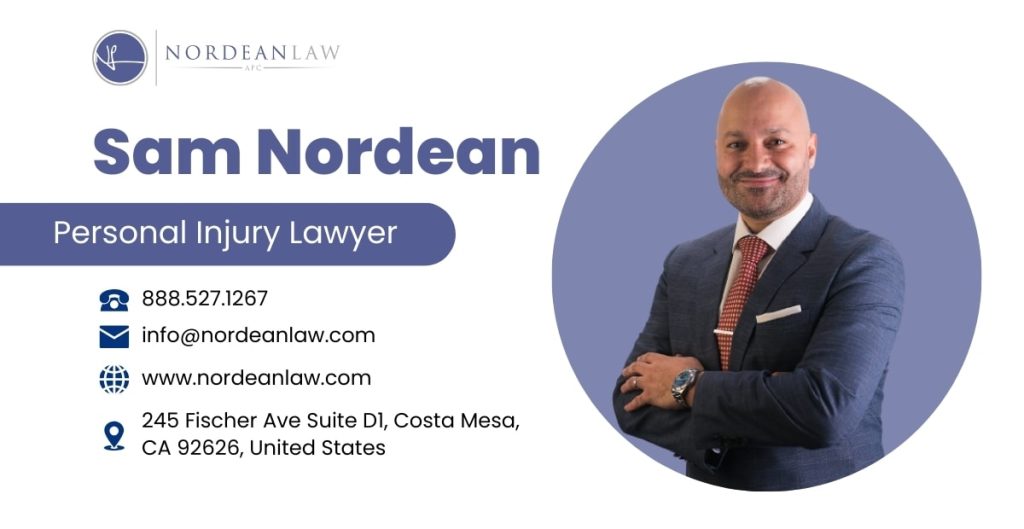Find out when and how to sue someone after a car accident. Learn about reasons to consider legal action and how to secure a fair settlement.

At Nordean Law, we strive to keep our community safe. We pursue justice for the injured and we share critical information on how to keep you and your family safe.
Follow the link below for the best tips to prevent accidents of all kinds. If you have a specific question, or if you were injured in an accident, reach out to one of our attorneys today.
Following a car accident, your worry often revolves around the pain from injuries and the looming burden of medical and vehicle repair expenses. To get some financial relief from these damages, you might wonder, ' Can I sue someone personally after a car accident?’
Although suing the at fault party is a potential course of action, it usually is not the initial step. Typically, you seek reimbursement for your expenses through the at-fault driver's insurance company rather than initiating a personal injury lawsuit. Nevertheless, there are circumstances where your Nordean car accident attorney might advise pursuing legal action. In this blog, we have explained all the details regarding suing at fault party personally after a car accident.
Yes, if you've been in a car accident, you can sue the person responsible for it. To sue someone for a car accident, you must prove they were at fault. To prove this, you must establish these four elements of negligence:
Deciding to pursue legal action is a big decision with substantial consequences. Going to court is time-consuming, and reaching an agreement can be tough. That's why it's a good idea to explore the settlement offers from insurance companies initially.
Ultimately, the decision to sue the other driver comes down to your choice. If you are ready to invest the time for legal action, you might secure a larger settlement. However, knowing when taking the legal route is right for you is crucial. You should sue someone for a car accident if:
Insurance companies aim to provide the lowest possible settlement, as they pay the bill, not the at-fault driver. If the offer doesn't seem fair or cover what you and your family need for a full recovery, suing the other driver becomes a good option for you.
The seriousness of the accident can affect the assessment of the compensation you deserve. If your medical bills keep increasing and the expected insurance money won't be enough, you might need to sue the other driver.
Carefully estimate your expenses and compare them to the offer from the at fault driver's insurance company. If you find the compensation amount unjust and your negotiation is unsuccessful, you can resort to legal action by suing the at fault party.
Yes, it is worth suing the driver responsible for your accident when the fault's driver's insurer is not offering lawful compensation. When you are not compensated correctly, the sooner you start exploring your options, the faster you can secure justice.
Remember that the Statute of Limitations can significantly affect your case, so don't delay. Talking to an expert car accident lawyer to discuss your incomplete compensation is a good idea.
During the lawsuit, you'll have to show the severity of the damages. This includes physical injuries, vehicle damage, emotional distress, and your ability to work. The process of suing may feel intrusive, as the other driver's attorney will investigate the situation. They will seek evidence to argue that the other driver wasn't responsible and may even imply that you share some fault
In this difficult situation, a personal injury lawyer will actively work to convey the accurate story to the court. They'll use the documents you provided to strengthen your case, seek further evidence, and counter any false claims from the opposing legal team. Legal support significantly increases your chances of obtaining a favorable settlement, as it makes the case straightforward and clear for the court.

When the insurance companies aren't working in your favor, it is a wise decision to hire a car accident lawyer. Pursuing a personal lawsuit can involve various complications and may be a demanding journey.
A car accident lawyer can help you cross the legal journey and get the rightful compensation. Talk to an experienced car lawyer at Nordean Law to evaluate your accident case. Contact us at 888.254.3222
How long can you file a claim after an accident?
Normally, you can file a claim within two years of the accident, but some exceptions can shorten or extend the timeline.
Can I be personally sued for a car accident in California?
Yes, you can be sued if you cause a car accident. California Civil Code §1714 defines who can be subject to legal action following a car accident. It establishes the right to sue a driver who didn’t exercise reasonable care on the road, leading to injuries, expenses, and property damage in a car accident.
Can I claim for personal injury if the accident was my fault in California?
No, you cannot claim personal injury compensation if you were entirely at fault. However, if you shared fault with other drivers and were not entirely responsible, you can receive compensation based on the percentage of fault.
Is the owner of a car liable for the accident in California?
When the at-fault driver was operating the vehicle with permission from the owner, the owner is liable for the accident.
When the at-fault driver was operating the vehicle with permission from the owner, the owner is liable for the accident.
No, you cannot claim personal injury compensation if you were entirely at fault. However, if you shared fault with other drivers and were not entirely responsible, you can receive compensation based on the percentage of fault.
Yes, you can be sued if you cause a car accident. California Civil Code §1714 defines who can be subject to legal action following a car accident. It establishes the right to sue a driver who didn’t exercise reasonable care on the road, leading to injuries, expenses, and property damage in a car accident.
Normally, you can file a claim within two years of the accident, but some exceptions can shorten or extend the timeline.